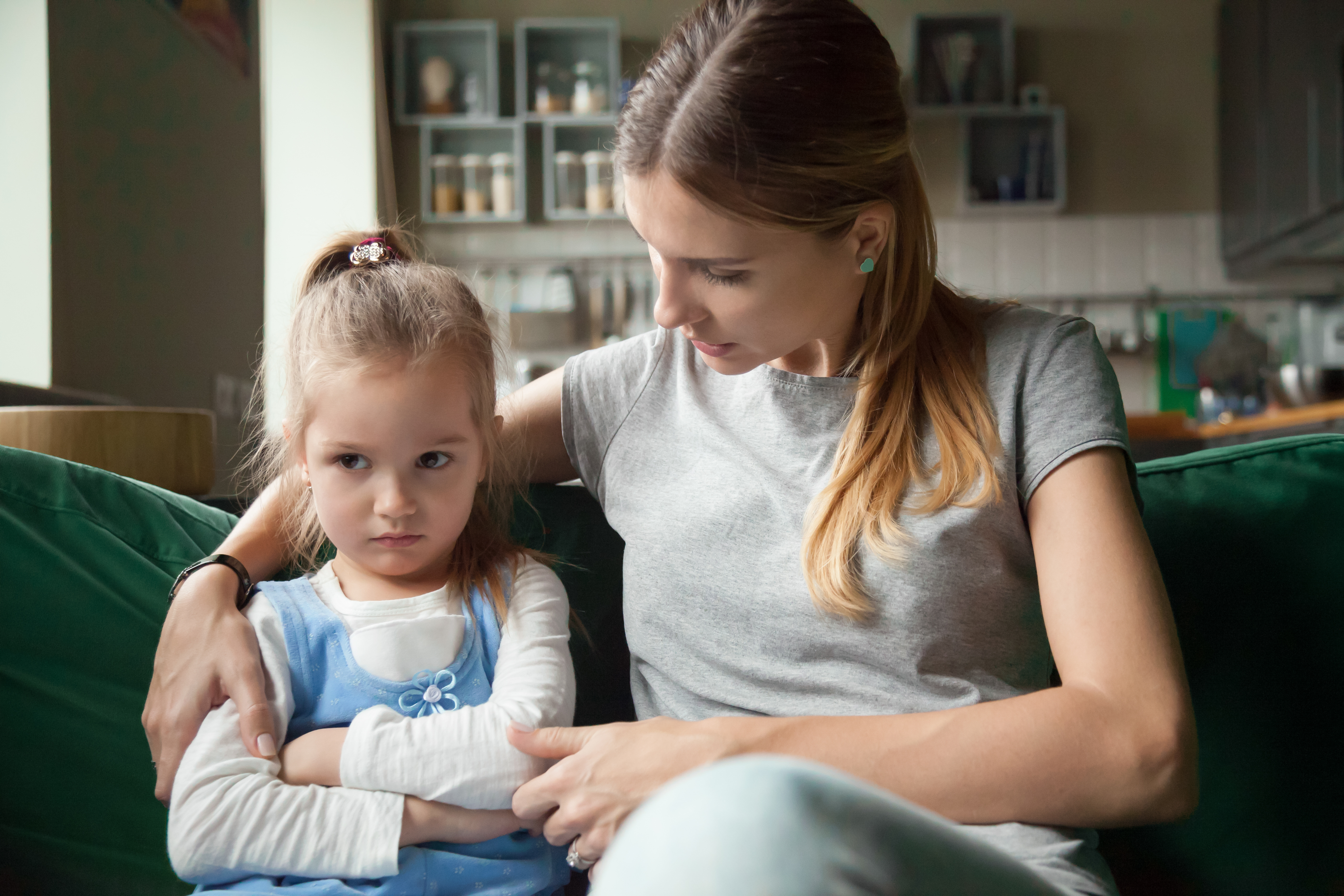
So unreasonable, right? But lashing out when we’re upset and blaming others for our distress are completely normal human reactions. Most of us gain the ability to refrain from these almost automatic reactions as we get older, but we all know adults who seem to go through their lives with a “chip on their shoulder” blaming others, and reacting angrily to real or imagined slights.
What’s this all about, and how can we help our children (and ourselves) grow out of it?
All mammals, when they’re in distress, go into fight, flight or freeze. So when your child steps on a toy and it hurts, she’s plunged into distress, and she goes into “fight.” She lashes out at whoever is closest, or even throws the toy.
Maybe it's all your fault because you said something and distracted her. Or maybe her brother just walked too close to her!
Or, something happens that hurts her feelings. Again, she’s in distress, so she goes into “fight.” She lashes out.
This isn’t because she wants to make others feel as bad she does. At that moment, she isn’t even considering others. In fact, when she’s in “fight, flight or freeze” she can’t think straight or access her empathy. She’s lashing out because she can’t bear her own feelings of hurt, fear and sadness. To fend them off, she gets angry. It’s an instant, automatic, response. The best defense for her at the moment seems like a good offense.
It’s easy to see how universal this is, if we look at our own tendency to lash out when we feel fear, disappointment or sadness.
- We almost run a red light, and yell at our kids for distracting us.
- We get a parking ticket and blame it on our partner for taking so long in the store.
- Someone we love dies, and we get angry at the doctor.
So the way our child blames her brother when she’s upset isn’t so different from the way we adults sometimes start to blame others when we’re upset. Hopefully, we adults are able to notice our impulse to blame, and bite our tongue before we go on the attack. If we can let ourselves feel the distress, but resist the urge to act on it, those unhappy emotions will move through us and dissipate. Once we’re calm, we often see that our impulse to blame someone else wasn’t fair.
But children don't have as much ability to self-regulate as adults do, because their prefrontal cortex is still developing. So how can you help your child learn not to blame others in these situations?
1. Stay calm.
She feels like it’s an emergency. Your calm attitude communicates that there’s no emergency, and she doesn’t need to be in “fight” mode.
2. Empathize.
Whether it’s her foot or her heart, she hurts. Acknowledging that will help her feel understood, less alone – and less like it’s an emergency. Bypass her anger and respond to the hurt or fear that’s driving the anger, which helps her understand her own emotions better: “Sweetie, that must hurt! Ouch!”
3. Don’t attack back.
Your child is attacking to avoid her own pain. If she can pick a fight, it’s a way of dumping the pain elsewhere so she doesn’t have to feel it. Don’t take the bait. Instead, when she says “It’s your fault!” you can respond “You are pretty upset… That must really hurt.”
If she’s attacking her sibling, you can say “Right now it seems like it's everyone else’s fault, doesn’t it? Your foot must really hurt. Let's help your foot, instead of blaming your brother. What can we do to help your poor foot?”
4. Model taking responsibility.
Your goal in this situation is to help your child assume her share of responsibility for stepping on the toy, instead of blaming someone else. So model taking responsibility in whatever small amount you can. When she “blames” by saying “It’s all your fault!” you might respond “You wish that toy hadn’t been there. Me too! That really hurt your poor foot. I so wish I could have seen this coming and gotten that toy out of there. I'm so sorry you got hurt.”
You aren't blaming yourself. You're helping her to not blame herself, or anyone else. The healing process in children is facilitated when we step into the story and model taking responsibility, which is the opposite of victimization.
5. Teach repair.
Later, when she’s no longer hurting, you can say to your child, “That really hurt your foot…No wonder you were so upset…And when you told your brother that it was all his fault, I think that hurt his feelings. I know it’s his toy, but he loves you and would never want to hurt you. I wonder how you can make things better with your brother now?”
6. Create a no-blame household.
When kids grow up in a household where blame is a way of life, they're more defensive and more inclined to blame than to take responsibility. Not surprisingly, families who focus on solutions instead of blame raise children who are more able to take responsibility, because admitting a mistake doesn't mean they're "wrong" or "bad."
Why not experiment with a no-blame household? Every time you start to assign blame, teach yourself to ask "What can we do to solve this?" instead.





